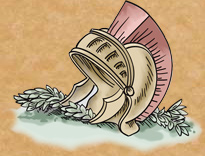During the time of the Roman Empire, very few people could read. Even many emperors and government officials could not read or write. So the Romans created spoken laws for those who could not read and written laws for those who could. This helped the Romans maintain control over the people they ruled.
There were no books, as we know them to be today. Words had to be written by hand on animal skins or papyrus, which resembled paper. The written sheets were kept in rolls that were called scrolls. There were few schools, and only certain boys were allowed to attend. Girls had to work in the home or on the farms. Many people were slaves.
From these times comes a legendary story about a young girl named Lyra. She was the only child of a Roman captain. Her father told her many stories about the places to which he traveled and the battles he and his troops fought. But Lyra was a very curious child who always wanted to know more. One of her questions caught him by surprise.
“Father,” she asked, “why can’t girls attend school and learn to read as do boys?”
He tried to explain. “There are many reasons, Lyra. Boys must be trained for future duty in the army. They must learn to fight and protect the women and children of the empire. Girls must stay at home and help take care of the land. There is no other work for women.”
Lyra replied, “But Father, surely girls could be of help if they could read.”
He quickly responded, “No, Lyra. Besides, they would not be accepted by the boys.”
“But I have an idea,” she continued. “I could cut my hair and dress like a boy. No one at the school need know that I’m a girl.”
“How could you think of such a thing?” he asked. “What if your identity is discovered? You could be tried before the court and sent into slavery.”
“That’s just it, Father,” she pleaded. “Not being able to read is just like being in slavery.”
There was a moment of silence. Her father seemed struck by his daughter’s words. Perhaps she and others like her deserve the right to read and learn about the world, he thought.
He smiled, hugged her, and said, “Lyra, you’re right. If you can’t read, you’ll never be completely free. We’re going to give it a try, regardless of what happens. But first we must change your name from Lyra to Lyrus. The rest is up to you.”
“Oh! Thank you, Father,” she cried with joy. “I’ll make you proud of me.”
Lyra cut her hair and changed her clothing to that of a boy scholar. She and her father traveled to the city of Rome, where she was introduced in school as Lyrus. No one noticed her deception. She was able to blend in with the boys in the class. However, she often did not participate in the games the boys liked to play. They made funny remarks, thinking Lyrus was a weakling. But it worked to her advantage. As time passed, Lyrus became recognized as the top student in the class. Upon graduation, the teachers chose Lyrus to speak before the senators in the forum, which was the center of Roman government.
It also was time to tell the truth. Lyra’s education had taught her the importance of moral character, which meant honesty with one’s self and others. Appearing as Lyrus, she stood before the gathering of senators and declared, “Honorable senators, I am not the boy Lyrus who speaks before you. I am Lyra, a girl who dressed as a boy throughout my schooling in order to learn to read and be educated in the wonders of our world.”
Upon hearing such words, the senators were stunned. Some began to shout: “We have been made fools by this girl.” Others cried out: “This could destroy our society as we know it. She should be arrested and put into slavery.” But other senators called for silence to allow her to continue. The forum soon became quiet.
Lyra then pulled forth a scroll from her toga. She held it high in the air and said, “Honorable senators, here is my speech. However, it is in writing. With all due respect, I ask each one of you to read it, instead of hearing me recite it. If each one of you can read it, I will call upon you to send me into slavery. However, if any of you cannot read, I beg you to free me of any wrongdoing so that I might teach you to read.”
Many of the senators could not read. They could make judgments only on the spoken laws, not the written laws. Her plea excited them and won them over. They shouted and rallied to her defense.
Soon after, Lyra became the first female tutor in the forum. She also grew to be a loved and respected teacher of both boys and girls in the Roman Empire.




